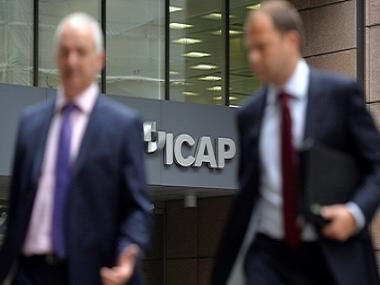ICAP and Tullett Prebon are planning to merge their voice and hybrid broking operations in an attempt to cut costs amid falling revenues across the industry.
A tie-up between the UK’s largest inter-dealer brokers aims to build scale after BGC acquired GFI earlier this year, but the latest deal has driven a stark divergence in the firms’ stock prices, suggesting that a big win for ICAP may have come at the expense of Tullett shareholders.
ICAP’s shares jumped 6% on Wednesday, extending gains made since the news began to circulate just days earlier. While Tullett Prebon shares initially jumped 8% on the rumours, they quickly reversed those gains to end the day 10% down after the terms emerged.
Under the agreement Tullett will take control of ICAP’s traditional broking operations, including iSwap and Fusion, in return for new stock representing 56% of the broker’s enlarged share capital.
ICAP’s streamlined operations will include its exchange-like electronic platforms EBS and BrokerTec, as well as post-trade processing businesses TriOptima and Reset and transaction processing business Traiana.
“The deal sees ICAP left with a very successful and high-quality electronic business and all of the post-trade services. It’s the part where we’re seeing double-digit revenue growth that has largely offset lower voice broking revenues,” said Owen Jones, analyst at Citigroup.
Post-trade and electronic operations have been buoyed by new regulations under Dodd Frank, EMIR and MiFID II that are pushing swathes of over-the-counter derivatives and securities onto exchange-like platforms and raising pre- and post-trade transparency requirements.
That has come at the expense of traditional voice broking services that faced headwinds from a QE-driven low rate and low volatility environment as well as regulatory pressure on banks’ trading operations stemming from Basel, CRD IV and the Volcker Rule.
Michael Spencer, group CEO of ICAP, has long stressed that falling broker revenues are a largely cyclical issue that would eventually reverse, but the merger represents an acknowledgement that the industry faces a more permanent structural shift.
“Financial regulatory reform means that the global financial markets have profoundly changed and this transaction means both companies will be better suited to meet the market’s changing needs and better serve our clients,” he said in a statement.
Structural decline
Alongside details of the new structure, ICAP reported that its revenues for the six months ending September 2015 had fallen 4% from the previous half year to £595m. Tullett Prebon saw a 3% decline in revenues in the first nine months of 2015 across its traditional business.
“We are seeing a structural decline across the industry and the demand to use voice to facilitate OTC trading has diminished and will continue to do so,” said Citi’s Jones.
That brings future revenue growth opportunities for the enlarged Tullett business into question, and while analysts expect shareholders on both sides to approve the deal, some opposition is expected from Tullett shareholders.
“The saving grace for Tullett shareholders is that they realise the company needed to do something, but they may have paid a hefty price to achieve that goal,” said Jones.
The deal values ICAP’s broking operations at £1.1bn, or 16 times earnings, according to Citi, while Tullett trades at just 10 times earnings. That differential comes in spite of broad overlap between the two businesses.
Cost synergies of £60m are envisaged, largely from back-office cuts. But at only 4% of the combined cost base of the two firms, analysts view that as a relatively low saving. Additional longer-term savings are likely in broker compensation as replicated desks are gradually consolidated.
With the deal expected to complete in the third quarter of 2016, Tullett stock is likely to remain hampered by the hefty share overhang. ICAP shareholders will be left with 36% of the enlarged Tullett group once the deal completes. ICAP will hold a 19.9% stake in Tullett through its new holding company, ICAP NewCo.
The path to an eventual tie-up has been smoothed by an easing of relations between the rival firms since John Phizackerley replaced Terry Smith as Tullett CEO last year. It sees the “big five” consolidate to just three, and raises questions around the future of Swiss IDB Tradition, with some suggesting the SFr467m market-cap broker could be snapped up by one of the two larger players.
All directors on ICAP’s board are expected to become directors of ICAP NewCo. Current group CEO Ken Pigaga will resign from his position and will be appointed as board director of the enlarged Tullett, and will take the role of COO. Spencer becomes president of Tullett and will act as an advisor to the Tullett board.
